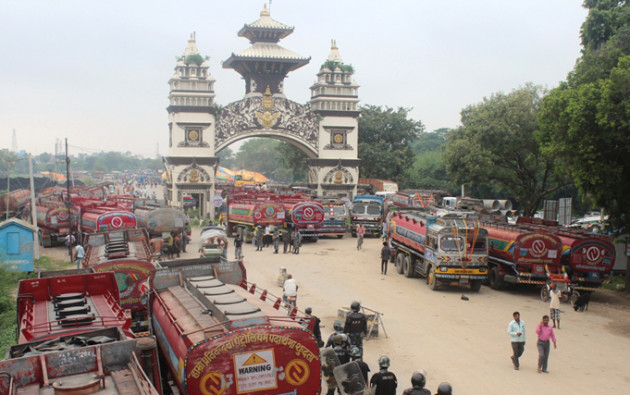Repercussions of political unrest threatens to envelop economy (Commentary)
By Sandesh Shrestha / Kathmandu, Nov 11: The relentless agitation in the southern belt of the country by the United Democratic Madhesi Front (UDMF) and the Indian government’s undeclared blockade on essential supplies at the border is having an adverse impact on the Himalayan country’s now-growing economy.
The continuing strike and the economic embargo has seen essential supplies to Nepal including fuel products and medicines being discontinued, pushing the country on the brink of a humanitarian crisis.
The consumers are not able to purchase commodities even with adequate amount of cash in hand whereas the lower rung classes including daily wage earners are at the frontlines of the artificial disaster. The prices of the daily essential commodities available for the consumers have skyrocketed and are likely to further spill over into other products in the market if the situation persists.
Chairman of Legislature Parliament’s Industry, Commerce and Consumer Welfare Committee Bhishma Raj Angdembe said the consumers are in dire straits and the shortage of products is taking its toll on the people.
The situation is becoming unimaginable for the consumers with no end in sight for continuing economic embargo. “We have been pressing the government, Ministry of Commerce and Supplies and the Department of Commerce to at least make the monitoring aspect effective to give some kind of relief to the consumers and make them feel the presence of a monitoring body, and also to curtail black market trading,” Angdembe said.
“The Committee’s focus is directed on insisting on just and transparent distribution of available products,” said Angdembe.
The Department of Food Technology and Quality Control has already apprised the committee that the country has enough stock of salt, sugar and rice, although it is facing some problems on cooking oil. The prices of a few kinds of pulses have increased while the rest are being supplied in the market in normal prices. The Committee is taking necessary steps to ensure that the products available in the market and those in stock are supplied to the consumers without hindrance.
The Committee has also directed the government to internationalize the undeclared blockade imposed by India. Angdembe said the country needs to quickly look for alternative routes.
Chinese and the Nepali authorities have agreed on opening all of Nepal’s seven border points at the north including the Tatopani-Khasa route which is the main channel of trade with China. With the onset of winter most of the border points apart from the Tatopani point will remain obstructed due to snowfall on either side of the border. The perennial threat of recurrent landslides in the aftermath of the massive earthquake which struck on April 25 looms large with deformed and cracked hills in Nepal which has created more problems to think about. The government authorities on both the side must take into account this eventuality.
The country has no contingency plan in place in time of emergencies as substantiated by recent natural calamity and the continuing political unrest in Tarai. “As per the international standard a country should have at least 90 days of stock and we are pushing for upgrading our storage capacity,” Angdembe said.
Meanwhile, hotel entrepreneurs are facing a tremendous loss due to the ongoing trade embargo with the tourist occupancy slumping to 25 per cent from the usual 90 to 95 per cent in the current peak season.
After the earthquake there was a flood of cancellations of bookings for the peak season, but the quake had struck as the earlier peak season was coming to an end. The blockade and the unrest have sent a negative message to the world community as the general movement across the country has been severely restricted owing to shortage of fuel.
“We had been anticipating less arrival of tourists – around 40 per cent decline – in the peak season following the earthquake,” said Hotel Association of Nepal (HAN) Executive Director Prabesh Aryal.
The arrival of tourists in 2014 stood at 792,000, which is expected to deplete by almost 50 per cent to 400,000 this season in the backdrop of the ongoing agitation and the undeclared blockade.
A delegation of the Federation of Nepalese Chamber of Commerce and Industry (FNCCI) had met with Prime Minister KP Sharma Oli recently warning of an economic catastrophe. The FNCCI team led by its President Pashupati Murarka told the PM that the country’s economy had suffered a loss of Rs 1,000 billion and warned that the businesses will have to shut down if the situation continued.
On Monday, the Airlines Operators’ Association of Nepal took the decision to hike the fare of domestic air flights in the country in the wake of increment of the price of Aviation Turbine Fuel (ATF) by two fold.
The Nepal Oil Corporation (NOC) was forced to hike the price of ATF as it had to transport the fuel from air route due to the blockade at the border. The ATF per liter which had stood at Rs 118 surged to be traded at Rs 233, and is unlikely to return to normal price unless supply of ATF resumes from land route.
The shortage of fuel products compounded with severe scarcity of cooking gas has sent the general public reeling. People are forced to queue up for four days to get less than five liters of petrol while some are getting handful due to their personal connections and unseen nexuses. The situation speaks for itself. The black market trading is flourishing and the government authorities are baffled and unable to contain it. RSS

